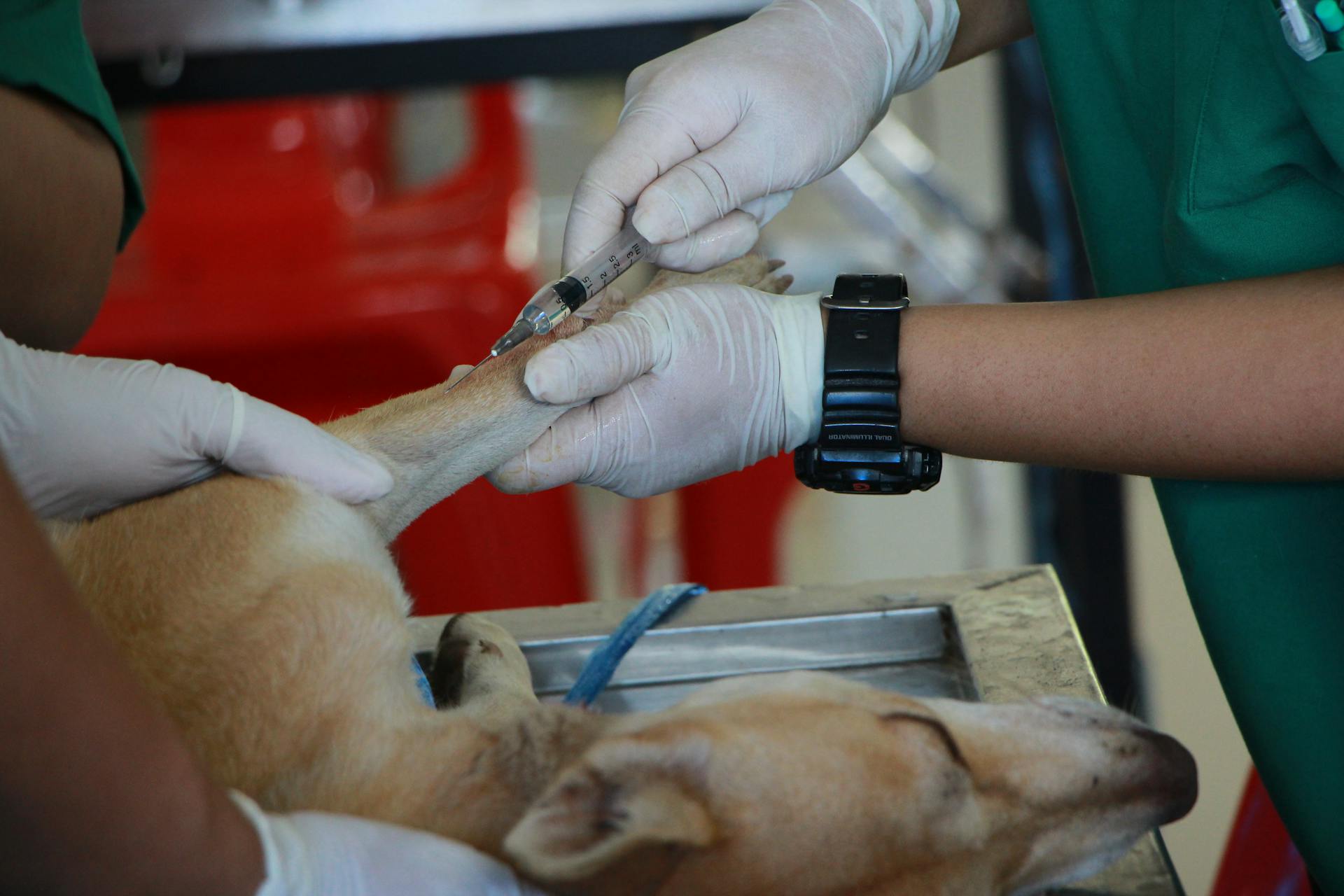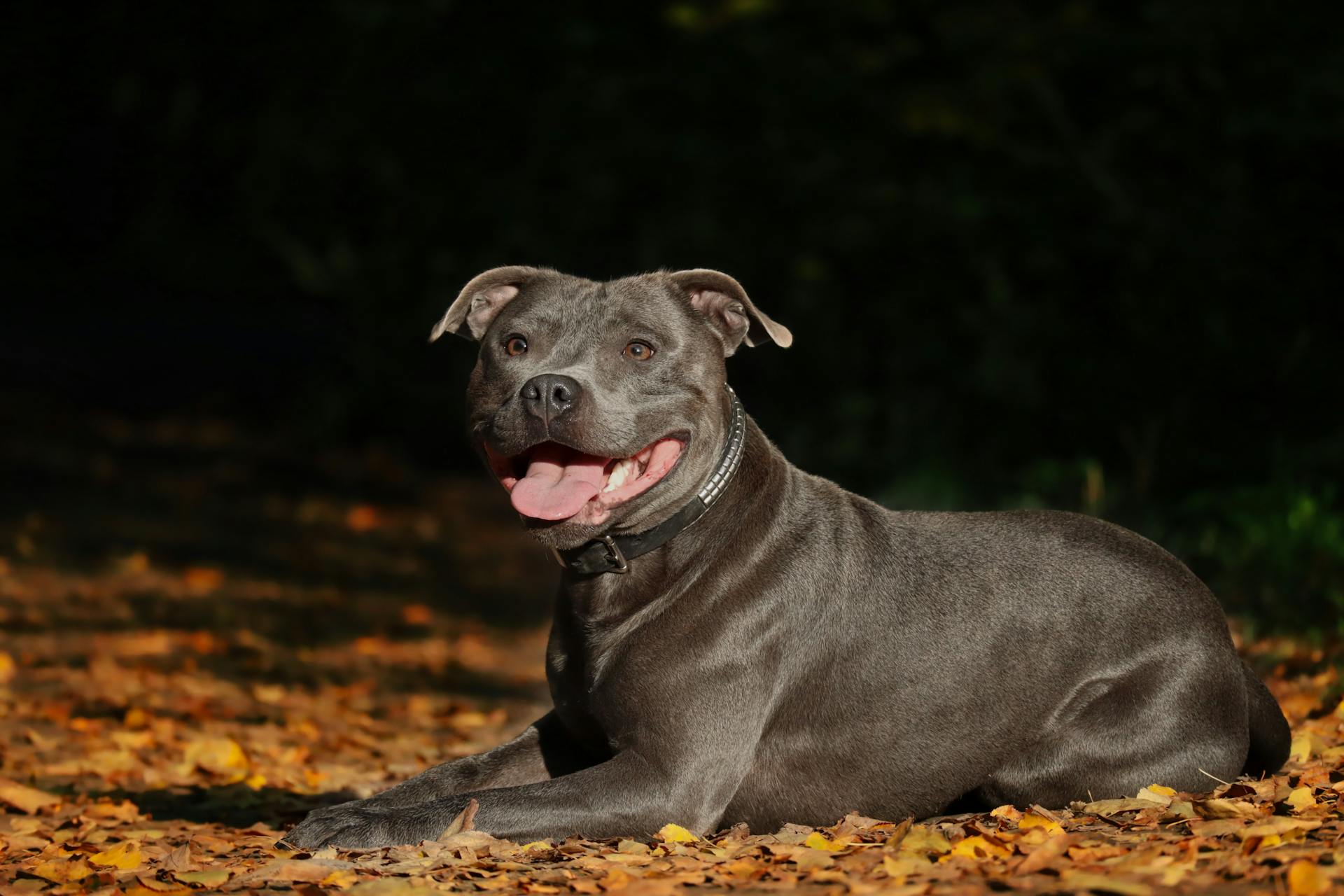
Researchers have been working tirelessly to develop a canine cancer vaccine, and a breakthrough in immunotherapy has brought us closer to a cure. This innovative approach has shown promising results in treating various types of cancer in dogs.
Studies have shown that a specific type of canine cancer, osteosarcoma, has a high success rate with immunotherapy treatment. Osteosarcoma is a common type of bone cancer in dogs, and this breakthrough has given new hope to pet owners.
The canine cancer vaccine is designed to stimulate the dog's immune system to attack cancer cells. This vaccine has been tested on dogs with various types of cancer, including lymphoma and melanoma.
Suggestion: Types of Dog Cancer Pictures
What is K9-ACV?
K9-ACV is a vaccine that aims to help the immune system recognize cancer cells as foreign.
Decades of research in mouse and human models have shown that tumor cells are very much like normal cells in that they express self-antigens that the body is taught to ignore early in development and throughout life.
The vaccine is based on the idea that by presenting cancer cells to the immune system in a way that breaks immune tolerance, the body can learn to recognize and attack them.
Safety and efficacy have not yet been established for use in canine patients, so it's essential to approach this treatment with caution.
In similar human tumor vaccine studies, hundreds of vaccines have been administered on an out-patient basis, and patients have been monitored for any adverse events.
Minor fever and minimal inflammation may occur over the next 48 hours after vaccination, but this inflammatory response is beneficial for the success of the vaccine.
Understanding Canine Cancer
Canine cancer is a serious issue that affects many dogs. Unfortunately, cancer screening programs for early detection in dogs lag far behind what is available for humans.
Cancer in dogs is often diagnosed in later stages of disease. This makes it more difficult to treat effectively and increases the likelihood of tumor recurrence.
The good news is that appropriately designed tumor vaccines can break immune tolerance. This leads to an effective anti-tumor immune response, which can improve survival and quality of life in veterinary patients.
Melanoma in humans has shown promise for immunotherapeutic approaches. This is because melanoma is quite immunogenic, making it a good candidate for cancer vaccines.
Individual molecule-targeted vaccines require precise knowledge of the targeted molecules. This can be a challenge when developing a vaccine.
A broader approach for vaccine development may be to use the entire tumor cell as the basis for the vaccine. This approach can deliver the vaccine in a manner that breaks tolerance to tumor cell antigens and promotes strong anti-tumor immunity.
Consider reading: Lifespan of Dog with Mast Cell Tumor
Developing the Vaccine
Scientists have been working tirelessly to develop a canine cancer vaccine, with the goal of creating a treatment that can prevent or even cure cancer in dogs.
The development process has been ongoing for several years, with researchers testing various approaches to create a vaccine that can target specific types of canine cancer.
Researchers have identified several key factors that can influence the effectiveness of a canine cancer vaccine, including the type of cancer being targeted and the age of the dog.
A promising approach has been to use a combination of tumor-specific antigens and immunomodulators to stimulate the dog's immune system to attack cancer cells.
Studies have shown that this approach can be effective in inducing an immune response against cancer cells in dogs.
The development of a canine cancer vaccine is a complex process that requires a multidisciplinary approach, involving experts in immunology, oncology, and veterinary medicine.
Researchers have been working with canine cancer cell lines to develop a vaccine that can target specific types of cancer, such as osteosarcoma and lymphoma.
The vaccine has shown promise in preclinical studies, with results indicating that it can induce a strong immune response against cancer cells in dogs.
Further research is needed to refine the vaccine and ensure its safety and efficacy in dogs.
Treatment Options
Canine cancer vaccines are a game-changer for dog owners who want to give their pets the best chance at beating cancer. They can be used to halt tumor progression by stopping the growth and spread of tumors in a dog's body.
Cancer vaccines can also eliminate residual cancer cells, which are cells that may have been left behind after surgery or radiation therapy. This is especially important because these cells can lead to cancer recurrence if not addressed.
Here are some ways canine cancer vaccines can help with cancer treatment:
- Halting Tumor Progression: Cancer vaccines stop the growth and spread of tumors.
- Eliminating Residual Cancer Cells: Therapeutic cancer vaccines help the immune system destroy these cells.
- Preventing Cancer Recurrence: Immunotherapy trains the body to recognize and destroy cancer cells quickly.
By using canine cancer vaccines, you can give your dog a better quality of life and potentially even extend their lifespan.
Immunotherapy Explained
Immunotherapy is a treatment that uses a dog's natural defense mechanisms to fight cancer. It's a targeted approach that attacks cancer cells while sparing healthy ones.
Before pursuing immunotherapy, it's essential to consider the availability of the therapy, the type and stage of cancer, and the dog's health status. Side effects can still occur, even if they're less severe than those caused by traditional treatments.
Expand your knowledge: Canine Cancer Immunotherapy
A veterinary oncologist can help you weigh the potential benefits against the risks of treatment. They'll consider factors like the effectiveness of the treatment, which can vary depending on the individual dog's cancer cells.
Immunotherapy works by introducing cancer-specific molecules to a dog's immune system, priming it to identify and destroy cancer cells. This means the treatment is very precise and only attacks the harmful cells, leaving the healthy ones alone.
Here are some pros and cons of immunotherapy to consider:
By understanding the benefits and limitations of immunotherapy, you can make an informed decision about whether it's the right treatment for your dog.
The Future of These Therapies
The Future of These Therapies is looking bright, thanks to ongoing research that's helping us understand canine immunology better. This means we can expect more advanced and user-friendly immunotherapies in the future.
These new treatments could offer more options for dogs with cancer, which is a huge step forward. Ongoing research is the key to unlocking better treatment options for our furry friends.
We can look forward to improved quality of life for dogs with cancer, thanks to these advancements.
Readers also liked: Beagle Research Dogs
Frequently Asked Questions
Is there a cancer vaccine for dogs?
Researchers are exploring a universal "cancer vaccine" that targets 30 proteins found on cancer cells, offering a promising preventive measure for canine cancer. This innovative approach is being studied in veterinary colleges in Wisconsin, California, and Colorado.
How much does the Oncept vaccine cost for dogs?
The Oncept melanoma vaccine for dogs costs between $6,000 to $9,000 for the initial treatment, which includes six doses. Costs may vary depending on your location and availability.
How much does the k9 ACV vaccine cost?
The cost of the k9 ACV vaccine is typically around $400 for a 3-injection series or $1200 total. Learn more about the vaccine and its administration costs.
Sources
- https://ardentanimalhealth.com/canine-cancer/
- https://cashmerevetclinic.com/k9-acv-canine-cancer-vaccine/
- https://www.ncbi.nlm.nih.gov/pmc/articles/PMC8393202/
- https://news.asu.edu/20190508-discoveries-world%E2%80%99s-largest-canine-cancer-vaccine-trial-begins
- https://pawsintograce.com/canine-cancer-vaccines/
Featured Images: pexels.com


